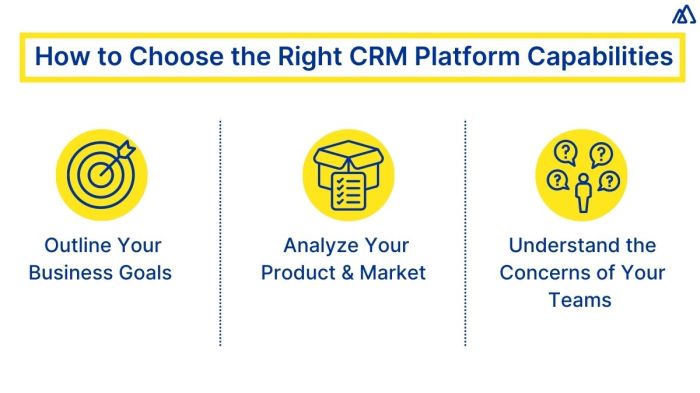How to Choose the Right CRM System for Your Business in 2025? It’s a question every forward-thinking business owner wrestles with. In 2025, the CRM landscape is a wild west of options, each promising streamlined workflows and skyrocketing sales. But choosing the wrong one? That’s a recipe for digital disaster. This guide cuts through the noise, helping you navigate the complexities and find the perfect CRM to fuel your business’s growth.
We’ll explore everything from understanding your specific needs in 2025’s dynamic market to evaluating crucial features, choosing the right deployment model (cloud, on-premise, or hybrid), and budgeting effectively. We’ll also delve into vital integration and scalability considerations, vendor selection, implementation strategies, and, crucially, data security and privacy. Get ready to ditch the CRM confusion and embrace a system that truly works for YOU.
Understanding Your Business Needs in 2025: How To Choose The Right CRM System For Your Business In 2025
Choosing the right CRM in 2025 isn’t just about ticking boxes; it’s about aligning your tech with your evolving business strategy. The market’s dynamic, and your CRM needs to keep pace. Ignoring this can lead to wasted resources and missed opportunities. This section will help you assess your specific needs in the context of current and future trends.
Several key factors demand consideration when evaluating your CRM requirements for 2025. The rise of AI, the increasing importance of data privacy, and the continued shift towards remote and hybrid work models are just a few of the significant changes impacting businesses. Your CRM needs to be flexible enough to adapt to these shifts and robust enough to support your growth.
Compliance Requirements and Standards
Meeting compliance requirements like GDPR (General Data Protection Regulation) and CCPA (California Consumer Privacy Act) is non-negotiable. GDPR, applicable across the European Union, grants individuals significant control over their personal data, including the right to access, rectify, and erase their information. CCPA, similarly, provides California residents with rights regarding their personal data. A CRM system must offer features that facilitate compliance with these regulations, such as data encryption, consent management tools, and data subject access request (DSAR) capabilities. Failing to comply can lead to substantial fines, legal battles, and severe damage to your brand’s credibility. For example, a hypothetical company, “DataWise Solutions,” faced a $10 million fine for GDPR violations stemming from inadequate data security practices within their CRM system. This illustrates the high cost of negligence.
Data Protection Measures within the CRM System
Implementing robust data protection measures is crucial. This involves a multi-layered approach. Encryption, both in transit and at rest, is vital to safeguard data from unauthorized access. Access control mechanisms, such as role-based permissions, limit access to sensitive data based on an employee’s role and responsibilities. Regular security audits and penetration testing can identify vulnerabilities before they can be exploited. Furthermore, employee training on data security best practices is essential to prevent human error, a major cause of many data breaches. Imagine a scenario where an employee accidentally shares sensitive customer data via email due to a lack of awareness. Implementing rigorous security protocols, coupled with regular training, mitigates this risk. Finally, incident response planning is crucial; having a clear plan in place to address data breaches quickly and effectively can minimize damage.
Final Summary
Choosing the right CRM system isn’t just about ticking boxes; it’s about aligning technology with your business goals. By carefully considering your needs, evaluating features, and understanding the long-term implications of your choice, you can unlock the power of a streamlined system. Remember, the right CRM isn’t just a software; it’s an investment in your future success. So, ditch the spreadsheets and embrace the efficiency – your business (and your sanity) will thank you.
